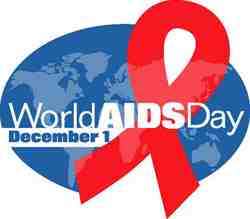World AIDS Day 2017
 On the first World AIDS Day, 1988, I was in London enjoying a performance of The Secret of Sherlock Holmes, with Jeremy Brett and Edward Hardwicke reprising the BBC portrayals I watched on PBS. I was already starting to work in the AIDS community in Chicago: a little volunteering, an increasing amount of grant writing for new organizations that couldn’t afford to put a development person on staff. Gay men - famous and not - were disappearing, only to have their deaths attributed to ‘a long illness’. No one was fooled. We all knew what was going on.
On the first World AIDS Day, 1988, I was in London enjoying a performance of The Secret of Sherlock Holmes, with Jeremy Brett and Edward Hardwicke reprising the BBC portrayals I watched on PBS. I was already starting to work in the AIDS community in Chicago: a little volunteering, an increasing amount of grant writing for new organizations that couldn’t afford to put a development person on staff. Gay men - famous and not - were disappearing, only to have their deaths attributed to ‘a long illness’. No one was fooled. We all knew what was going on.Though it wasn’t why I went to London, I think I probably had some belief that I could get away from AIDS. As it turned out, I couldn’t even get away from it in the theatre.
At the curtain call, Brett made a speech. “Today is the first World AIDS Day,” I remember him saying. He went on to explain that ushers would pass buckets around to collect money for London’s AIDS organizations. I put a few pounds in the bucket and filed the idea away as a good one: curtain call appeals were rare.
The following year in Chicago, I stole the idea, sending teams of volunteers out to theatres to make curtain speeches and collect money for our organization. It was surprisingly easy, and was repeated, though no organization approaches the outrageous success of Broadway Cares/Equity Fights AIDS’ curtain speeches. Theatre companies vie for top fundraising items, not just collecting money in the buckets, but auctioning off autographed programs, posters and - as Hugh Jackman and Daniel Craig did during the run of A Steady Rain - performance-worn t-shirts. I loved both of them in the play, but seriously: a sweaty t-shirt? No, thanks. Still, last year over $7 million was raised on and off Broadway and with national touring productions. It’s a testament to the determination of the theatre community to end the epidemic.
For years after I burned out, my only activity on World AIDS Day was attending a church service or maybe thinking about those lost. When I started writing and became active again in the community, I gave presentations and attended events. This year, though, I’m not going anywhere.
I’m hard at work on a book I resisted writing for a long time - Fag Hags, Divas and Moms: The Legacy of Straight Women in the AIDS Community. It’s a difficult book to write for a lot of reasons. First and foremost, I want to do justice to the women in the book, whose accomplishments over the last 36 years have gone largely unnoticed. Second, no book can include all of them, so the women in the book must represent thousands of others.
But it’s been difficult emotionally as well. When I told a friend about some of the women I interviewed, he said, “It’s not like you’re taking notes in a lecture.” His concern seemed odd, but he was right. As I listened to these women talk about the friends and family members they mourned so deeply, describe their frustration and anger with bureaucracies and bigotry, and more often than not, cry when they remembered the lives lost...well, the stories affected me, too.
That’s not to imply that this book is depressing. It’s not. There are stories that will make you sad, others that will make you angry and a few that will surprise the hell out of you. It’s also possible you’ll laugh out loud. And I’m quite sure you’ll learn a lot. I know I have.
So this year I’ll spend World AIDS Day with these women. I’ll listen to their stories and figure out how to share them. I’ll make sure people understand the context of the times, whether they’re women who were there at the beginning or those who work today to end the epidemic.
And on the next World AIDS Day, I hope the women who couldn’t fit in the book will be motivated to tell their stories, too. Because when the history of the epidemic is written in the past tense, the world needs to know that straight women were there...and still are.
For more information:
Fag Hags, Divas and Moms: The Legacy of Straight Women in the AIDS Community
Broadway Cares/Equity Fights AIDS
World AIDS Day

